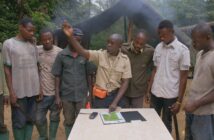Our sustainable livelihood programs that promote the UN’s Goal 8 also work towards Goal 12, to “ensure sustainable consumption and production patterns.” Through land-use planning, the promotion of innovative sustainable livelihoods and environmental education programs, JGI works towards the UN goal of achieving sustainable use and management of natural resources for all and the environmental education for all on sustainable development and lifestyles by 2030.
Environmental education is the backbone of all of JGI’s initiatives. Whether we are educating village members around key primate habitat about the limits of their natural resource availability or we are teaching young people all over the world to use Geospatial technology to map out issues in their areas, we leverage education to promote sustainability. Our goal of this education is to not only save biodiversity, but to ensure that people and animals can live in harmony with the environment in perpetuity. Through Roots & Shoots training around the world to awareness campaigns around key ecosystems, JGI educates people about the importance of the environment and their roles as stewards of their natural heritage.
While we have already touched on how we promote sustainable livelihoods and development, we have not delved into the technology which enables us to monitor our success. The UN includes in Goal 12 a need for tools that monitor sustainable development. Our use of geospatial technology and satellites allows us to monitor forests on a regional scale like never before, and by contributing data to Global Forest Watch, we help build into a global database on the state of the world’s forests. This technology helps in creating land-use plans with community members. Our in-the-field forest monitors use mobile technology to supplement satellite images with real-time data on habitat health.
Finally, sustainable development would not be complete without considering how ecotourism can play a vital role in boosting local economies while protecting and promoting wildlife. JGI support initiatives that increase forest trails in national parks and reserves with primate populations in order to increase tourist access. And as JGI builds out to its new island sites at the Tchimpounga Chimpanzee Rehabilitation Center, we are including tourist viewing opportunities in order to increase local and international interest in continuing to protect primates and biodiversity.





